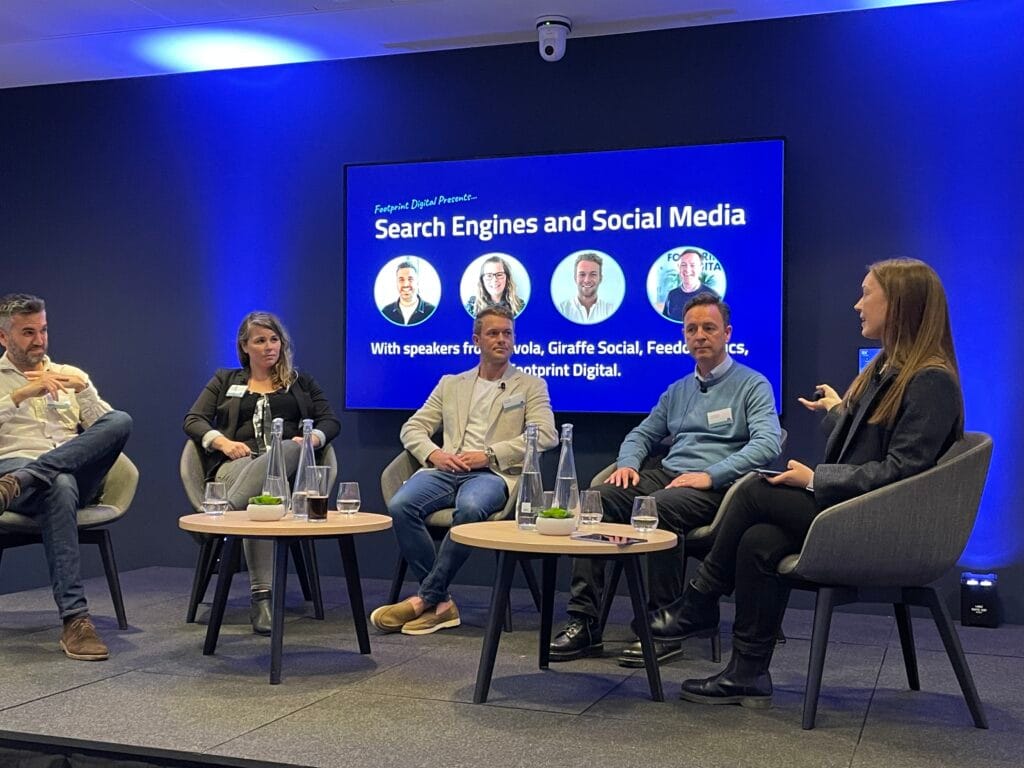
Blog
Search Engines and Social Media: Privacy, Consumer Trust, and Influencing
24th May, 2024
How do privacy concerns, data protection regulations and consumer trust impact the way users engage with social media platforms versus traditional search engines?

This question from our panel discussion looks at privacy concerns, data protection regulations, and consumer trust in the digital age. As users become increasingly aware of how their data is collected and used, these factors significantly influence their engagement with social media platforms versus traditional search engines. While reports indicate a strong consumer desire to build relationships with brands, there is a growing demand for transparency and clarity regarding data practices.
With regulations like GDPR and changes in data policies by companies like Apple, marketers face new challenges and opportunities in leveraging first-party data to build trust and foster community. Join our panel, Alex Jeater, Kate Webster, Tom Walker, and Mick Scanlon as they explore how brands can navigate these complexities, maintain consumer trust, and continue to engage effectively across different digital platforms.
Mick: Google recently did a report about people’ opinions on trust and signing up to certain websites and brands. They found that 84% of people want to have a relationship with people they buy from, so the appetite is there. It’s not as if people have been turned off because of bad news stories like Cambridge Analytica.
People are ready to engage with content and brands, but the thing that’s holding them back in many instances is the lack of clarity around how data is captured, what brands are doing with data, the way that they ask people for their information.
The GDPR, Consent Mode V2, Apple taking away data from things like Facebook, all of that has said to me that marketers back in the day maybe got a bit lazy.
We thought that unlimited access to data would last forever and people are a lot more savvy now and understand what websites do. Marketers need to take that on board, Google handed us everything but we now need to understand data collection a whole lot more. Things like collecting and using first party data and using that to make sure you;re delivering the right content has never been more important than it is now.
When it comes to trust, again people are a lot more savvy and they’ll see through you if you put out fake testimonials or try to game the system or pull the wool over their eyes.
The thing is to be real and human. Understand the data that you can collect now, the first party data, and use it to your advantage and foster engagement and build brand community.
Kate: People are definitely savvier with their data, but there’s still a way to go with that. We saw that a lot with the IOS 14.5 changes where all of a sudden all of the apps had to ask people for their permission to track their data on third party websites. What we saw was people saying a blanket ‘no’ to everything, thinking that was going to reduce the amount of ads they were seeing, not realising that it wouldn’t reduce the amount of ads they saw, just the relevancy of those ads to them.
Mick: A lot of the time this topic gets misrepresented and misunderstood by consumers. As marketers, we still get to deliver ads to the same audiences, we just don’t get the visibility that we had before.
Alex: Yeah, and actually the programmatics on those ads are so good on platforms like Meta now, that we saw some issues at the time, but now there’s little to no difference for marketers because of the programmatics.
I also think there’s a bit of an attitude shift, and people use social media platforms in spite of some of the data protection issues. There’s 150 million US users of TikTok and there are concerns about the ownership of TikTok, but they’re still using the platform for 125 minutes a day, and the algorithms are so good and so addictive sometimes that I think people are going to use them despite data concerns.
Mick: The word that stands out for me is trust. So long as you’re telling people why you’re collecting their data and explaining what that’s for, again 84% of people will buy into that.
There’s the challenge of incentivising that, and you’re probably not going to weigh the situation in your favour if you just ask people a simple, cold yes or no question to collect their data.
But if you tell them you’ll send them the latest offers, they’ll get your newsletter, they’ll get a 10% discount, and so long as you deliver on those messages they’ll keep coming back.
It’s that thing about community. Social media is second nature to some demographics and it makes absolute sense that people want that sense of community online.
Communities aren’t parks and housing estates anymore, they’re these online communities that people are buying into and they’re getting affirmation from their decision making online, they’re aligning themselves with these communities from a brand, personal, and socioeconomic perspective. That’s where people go for a community experience now, so marketers and brands need to understand that.
Kate: This is where influencer marketing has become important on social media. It’s very difficult for me to look at a celebrity like Taylor Swift and think, ‘oh, yeah, we have something in common’ because we almost certainly don’t whereas seeing an influencer who looks like me, acts like me, has a more similar life to me, that is so much more powerful when it comes to convincing most people.
Tom: We’ve seen that the micro influencers typically have a much bigger impact than a celebrity or a larger influencer posting brand content, because they have more of a real community and engage with their audience on a more regular and personal level.
Converse did a study where they had a really famous individual who was charging thousands of dollars per post about their shoes versus individuals and micro influencers who had around 10-15,000 online followers and got them to post about the shoes, too. They sold around 3 times the amount at a 7th of the price across the board with the micro influencers than with the celebrity. It also just comes down to authenticity and transparency as well.







